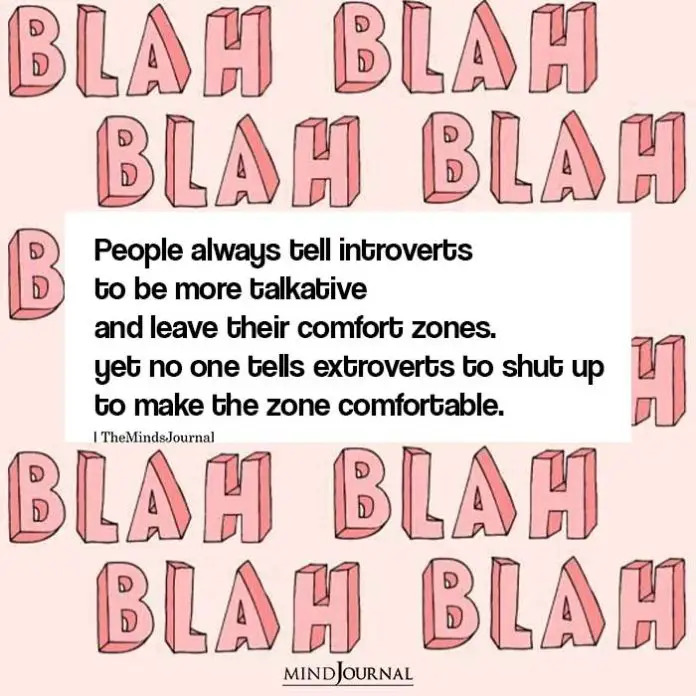Do you know someone who always talks about themselves? Who never let others speak and hog the spotlight in every conversation? These types of people are known as conversational narcissists and can be hard to deal with.
What Is A Conversational Narcissist?
Conversational narcissism refers to the trait of making every conversation about yourself. A decent conversation involves balance with both people adding their views and opinions and expressing themselves equally.
However, when you are talking to a conversational narcissist, the entire focus of the conversation will revolve around them. They are so habituated with this behavior that they are often unaware of it or may simply don’t care.
Author and therapist Wendy Behary, LCSW explains “Conversational narcissists don’t necessarily meet the criteria for a formal diagnosis of narcissistic personality disorder (NPD). They’re usually somewhere on the spectrum, though.”
In his book The Pursuit of Attention: Power and Ego in Everyday Life, American sociologist and author Charles Derber explains that these individuals have a strong tendency to dominate conversations as they want to focus on themselves.
Not only are they unable to stop talking, but they also need too much attention and want to tell others how amazing they are. On the other hand, they might also talk about their problems and may nag for the entire length of the conversation. Dr. Derber writes that conversational narcissism is “the key manifestation of attention-getting psychology in America,” and that it occurs mostly in “informal conversations among friends, family, and co-workers.”
Related: How and Why Narcissists Try to Destroy You With Circular Conversations
A conversational narcissist may steal the spotlight during a conversation in the following ways:
- They will talk before others to take charge of the conversation, no matter what the topic or subject is
- They will constantly keep talking about themselves and make sure you don’t get any chance to squeeze in a word
- They will repeatedly interrupt other speakers and change the subject to themselves
- They will never react, validate or support your opinions so that you stop speaking, unless you talk about them
Identifying A Conversational Narcissist
If you are having trouble spotting them, then here are a few common signs of conversational narcissism that will help you point out the person who talks about themselves all the time:
- The conversations are never interactive, they are always like a one-sided, unending monologue.
- They have an heightened sense of self-importance.
- They will interrupt you mid-sentence to bring the focus back on themselves, even if you’re saying something important. They always have a better story to tell.
- They talk continuously and are unable to stop. In fact, the conversations can be so long that it may feel like a lecture.
- They tend to exaggerate the value of their own accomplishments
- They constantly seek respect, appreciation, admiration, approval and validation from others.
- They are not focused on building connections with others or engaging with the listener.
- They often have unrealistic expectations from the listener and believe that others must respect their opinions without hesitation. They may even criticize others’ opinions.
- They are often self-absorbed and fantasize about beauty, success or power.
Related: Signs of Narcissism
How To Cope With A Conversational Narcissist
If there is someone in your life who always talks about themselves, and if you can’t avoid them, then there are some strategies that can help you respond better to them. Here are a few ways that can help you to deal with conversational narcissism:
1. Listen, but stop the conversation when you need to
If you have a friend, family member, coworker, or a boss who talks only about themselves, then you might have to listen to them even if you don’t really want to. However, when you listen to them try to identify what their actual need is.
Do they want admiration or appreciation? Or do they want to boost their ego? Once you realize this, interrupt them and tell them something simple yet positive about them. But it is likely that they might want to continue their monologue or change the topic to something else. That’s when you need to stop the conversation, especially when it continues for too long.
Psychotherapist and author F. Diane Barth, L.C.S.W., writes “It’s really not damaging to tell someone who you’ve been listening to for more time than you have to spare (and more than you want to give away) that you’re really sorry, but you have work you have to do and you’ll have to continue this conversation later.”
2. Set boundaries
Make sure to protect your boundaries. By setting healthy boundaries you can restrict their access to you and prevent them from exhausting your time and energy. Therapist Wendy Behary, LCSW says “When you know someone has this trait, set limits to your exposure to them.”
This is especially important as you cannot have a reasonable conversation with a narcissist. However, if you have to interact with them, be mentally prepared for it, set a time limit, and look forward to cultivating a two-sided conversation, if possible.
Related: Boundary-Busting Narcissist? How to Set Boundaries With A Narcissist

3. Curb your expectations
Although you should try to have a mutual interaction with a conversational narcissist, you should not expect too much from them. Don’t have many expectations from them. Don’t demand anything from them. When you feel like ending the conversation, communicate that in an assertive manner and simply walk away. Do not provide any support statement. Simply smile and leave.
4. Realize that you cannot change who they are
“You won’t be the one to change them,” says psychologist Ramani Durvasula, Ph.D. So make sure not to take things personally. Try to resist the urge to challenge their opinions and thoughts. The secret to winning against them in silence.
The more unresponsive you get, the more frustrated and uncomfortable they will become. When they start becoming desperate for your attention, bring your awareness to your breath and clear your mind, while maintaining eye contact. Then when you need to, end the conversation.
5. Be a conversational narcissist
The best way to deal with conversational narcissism is to use reverse psychology and become a conversational narcissist yourself. Simply flip the script start talking about yourself and dominate the conversation.
Talk about your achievements, your goals, struggles, dreams, and your feelings. And if they start interrupting you, be critical of them and continue talking. Not only this will change the game, but it will give them a taste of their own medicine.
Related: How To Keep a Conversation Going? The Art Of Listening For Hooks
Why A Conversational Narcissist Can’t Shut Up
People who always talk about themselves are usually agenda-driven and feel rushed to make their points without connecting emotionally with anyone. They may also lack an emotional quotient or emotional intelligence (EQ).
However, this largely varies from one person to the other. So while one conversational narcissist might be depressive, the other one might simply don’t care about others and maybe too self-absorbed. Whether talking about themselves makes them feel good or if it is a sign of depression, there is no doubt that this is an act of needing attention.
As they have low self-esteem and a poor sense of self, conversational narcissists may feel gratified when other people listen to them. “They perceive this as proof of their own worth. This type of person fails to get in tune with other people’s desires. Instead, they always revolve around their own needs,” explains an article in Exploring Your Mind.
Talking about themselves makes them feel worthy and enables them to avoid their inner dialogue and sufferings. They are afraid of self-talk and hence they force others to listen to them. It allows them to feel heard and gain a different perspective about their own persona.

Perhaps this is why most of their stories seem to be tall tales that show how great and amazing they are. These stories enable conversational narcissists to build a false image of themselves. Moreover, they also expect appreciation from others to feed their feeble ego and low self-esteem.
On the other hand, some might share all their problems with you and expect life-altering advice from you as if you are their therapist. However, they will never be available to listen to your problems or give you any advice.
Related: The Eight Levels of Disclosure That Will Help You Extend A Conversation
People who always talk about themselves never take part in a conversation. They simply engage in the manipulation of words to get attention. They will make you feel compelled to listen to them, feel sorry or praise them. But you will never share a real bond, friendship, or relationship with conversational narcissists.
Here are a few other reasons why conversational narcissist always talks about themselves can simply shut up even when they should:
- Insecurity
- Desperate need for attention
- Strong need for external validation of emotions
- Lack of social sensitivity
- Immaturity
- Lack of social skills
Although they may realize at times that they are annoying others, however, they are simply unable to stop talking about themselves.
They Think They Are The Center Of The World
In the beginning, conversational narcissists often appear very sociable and friendly individuals with charming personalities and good conversation skills. They are open to sharing about themselves and are easy to know. Their willingness to discuss their personal life may make you think that they will be willing to listen to you as well.
However, as you get to know them better, you realize they ONLY talk about themselves all the time. They are almost insensitive to your needs. No matter what the topic is, they will always control the conversation and make it about themselves. They never seem to shut up.
Related: 10 Most Popular Psychological Persuasion Theories To Influence People
This can leave you feeling drained as it was more of a competition for attention than a real conversation among two people. “Many people make conversations into competitions,” write authors Brett & Kate McKay of Art of Manliness.
They add that such people “want to see if they can get the edge on the other people in the group by turning the attention to themselves as much as possible. This is accomplished through the subtle tactics of conversational narcissism.” Due to their narcissistic personalities, these egocentric individuals believe that everything revolves around them.
They are not bothered about annoying or boring other people as long as they can talk about themselves. And if you dare to change the subject or tell them directly about their behavior, they will put the blame on you for being an egocentric narcissist.

But All Of Us Talk About Ourselves
Although narcissism can be one of the major reasons for talking about your own self all the time, there may be some other simpler reasons as well. As we are social beings, connecting personally with others by sharing the forms of our experience is an integral part of the human experience.
According to Scientific American, most of us tend to talk about ourselves for almost 60% of conversations on average.
This can rise up to 80% when we communicate on social media. But why? Why do we love talking about ourselves, if we are not narcissistic? Because talking about self makes us feel better. “Simply put, self-disclosure is gratifying. It gives us a neurological buzz,” writes Samantha Boardman M.D., founder of Positive Prescription.
Related: 5 Ways Talking To Yourself Helps You, According To Science
Research conducted by Harvard University found that talking about ourselves can be “intrinsically rewarding.” The study found that self-disclosure is significantly linked with enhanced “activation in brain regions that form the mesolimbic dopamine system, including the nucleus accumbens and ventral tegmental area.” In fact, it was also observed that some people may even give up money to talk about themselves.
However, it is not always about feeling good about yourself. Different studies indicate that too much self-disclosure can be a sign of severe emotional distress, rather than just being self-absorbed. A study from the University of Arizona found that self-referential language is often associated with negative emotionality and depression.
The study states “Depressive symptomatology is manifested in greater first-person singular pronoun use (i.e., I-talk).” If you know someone who appears self-obsessed and focuses on themselves in every conversation, then it may be a sign of anxiety, tension, anger, worry, or even depression. “Some conversational narcissists may actually be very anxious. So they bind their anxiety by talking about what is familiar to them – which may be themselves,” says licensed psychologist Ramani Durvasula, Ph.D.
Related: 7 Conversation Hacks That Will Help You Hit It Off With Anyone
Conversations Are Not A Competition

Unfortunately, a conversational narcissist fails to realize that there is no competition. They fail to understand that conversations are interactive. It involves sharing of ideas, opinions, and feelings from both or all involved parties. It is not a one-way game where the narcissist will deliver an unending monologue.
But it is not your job to make them realize that. The more you try to change them, the more you will feel stressed and anxious.
If someone who talks a lot about themselves makes you feel uncomfortable or frustrated, then the best thing for you to do is simply smile and walk away.
Related: The Art of Conversation: 25 Great Conversation Starters
Here is an interesting video that you may like:










Leave a Reply
You must be logged in to post a comment.